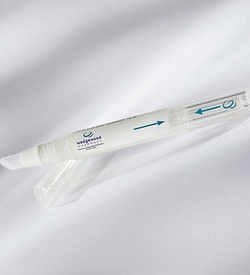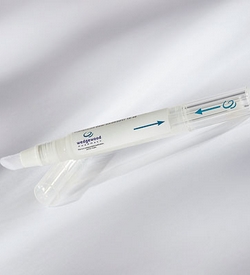Providing Quality & Trust
Methimazole Transdermal Gel Twist a Dose
Wedgewood Pharmacy
$39.31 - $43.48
$39.31 Each
Detailed Description
Methimazole: Transdermal Gel Twist a Dose
Methimazole is a human drug, used for the medical management for hyperthyroidism. Methimazole inhibits the synthesis of thyroid hormones by interfering with metabolic steps involving iodine incorporation and the formation of iodothyronine. Methimazole has no effect on pre-existing circulating or stored thyroid hormones and it has no effect on supplemented thyroid hormones.
Methimazole may be prescribed for:
- Hypothyroidism
- Hyperthyroidism
Prescribed For:
- Cats
One of the dosage forms available for Methimazole is Twist-a-Dose Transdermal Gel. A Wedgewood Pharmacy exclusive. We dispense transdermal gels in our exclusive Twist-a-Dose® applicator.
With just two steps, a no-mess applicator, and no tiny markings to read, you can rest assured that patients will receive the prescribed amount of medication while reducing exposure to the pet owner.
Cats:
Methimazole currently is the drug of choice to treat feline hyperthyroidism. It has largely replaced propylthiouracil for this purpose due to the lower incidence of adverse side-effects. Treatment with methimazole is a form of medical management for hyperthyroidism; it does not cure the condition.
Cats being treated with methimazole should be monitored closely for the first three months. They should receive a CBC, platelet count, serum T4 every two to three weeks; liver function and ANA testing may be performed as needed.
Endogenous circulating T4 levels should be reduced in one to three weeks. After the animal is stabilized on the medication, T4 levels should be followed every three to six months.
Available:
73 strengths of Methimazole Twist-a-Dose Transdermal Gel, ranging from 0.1 mg/0.05ml to 15 mg/0.05ml.
Methimazole Side Effects:
- Adverse side-effects due to methimazole use usually occur within the first three months of therapy.
- Common: transient GI-disturbance including anorexia, vomiting, and depression. Methimazole is a very bitter medication. Different formulations of the medication are available and giving the medication with food may improve palatability. Transient hematologic disturbances (eosinophilia, leukopenia, lymphocytosis) are seen in about 15% of cats. These usually occur within the first two months of therapy. Approximately 50% of animals receiving methimazole for greater than six months develop a positive ANA. These cats may require a dose reduction.
- Rare: Within the first few weeks of treatment, a small percentage of cats self-mutilate their faces and necks through scratching. These animals probably will need to discontinue treatment with methimazole. The most-serious side effects include bleeding, thrombocytopenia, agranulocytosis, and hepatopathy. These animals should discontinue treatment and probably will require supportive therapy. Acquired myasthenia gravis has been reported.
Precautions:
- Methimazole should be used with caution and with extra monitoring in cats with liver disease, autoimmune disease, or pre-existing blood abnormalities.
- Individual response to methimazole may vary. Regular monitoring of T4 levels is necessary in order to avoid drug-induced hypothyroidism.
- Methimazole readily crosses the placenta and is excreted in milk. Kittens out of queens receiving this drug may be born hypothyroid. They should go on milk replacement after receiving colostrum.
Drug Interactions:
No reported drug-interactions in the cat were found in the literature. In humans, methimazole is reported to potentiate the activity of some anti-coagulants.
Instructional Video

Powered by nopCommerce
This site is running in live payment mode. Real payments will be processed.

